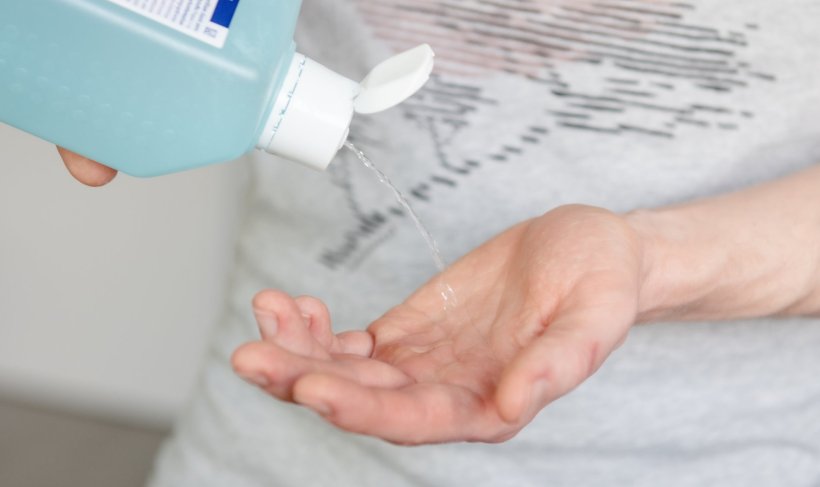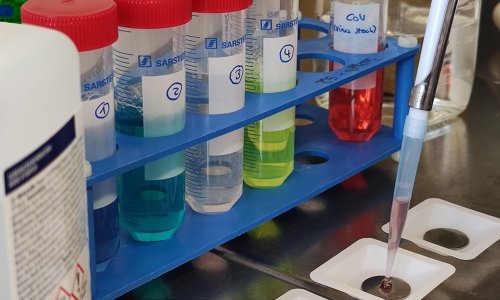
© RUB, Marquard
News • Hard to break down
Hepatitis E: Most common hand infectants no match for HEV
The hepatitis E virus (HEV) can cause serious liver inflammation and is the most common cause of acute virus-mediated hepatitis worldwide. Infection can be prevented through appropriate hygiene measures.
Scientists from Twincore, Centre for Experimental and Clinical Infection Research, the Hannover Medical School (MHH) and the Ruhr University Bochum (RUB), together with partners from industry and supported by the German Centre for Infection Research (DZIF), have investigated the effectiveness of various common hand disinfectants against HEV. They were able to show that most formulations do not completely inactivate the virus. The results have been published in the Journal of Hepatology.
The alcoholic components dissolve the lipid envelope, but the resulting naked viruses are still infectious
Patrick Behrendt
In Germany and Europe, HEV has its natural reservoir in pigs. The infection can pass from the animals to humans, which is referred to as a zoonosis. This often happens through incompletely heated or raw meat products such as minced meat. In tropical regions of the world, infections occur via contaminated water, sometimes with large outbreaks. "Some of these infections could possibly be prevented with the right hygiene measures," says Dr Patrick Behrendt, a doctor in the Department of Gastroenterology, Hepatology and Endocrinology at the MHH and head of the junior research group 'Translational Virology' at Twincore. This includes, above all, correct hygienic hand disinfection in everyday clinical practice when dealing with hepatitis E patients and infected animals. Together with the team of Prof. Dr. Eike Steinmann, head of the Department of Molecular and Medical Virology at RUB, Behrendt investigated whether common hand disinfectants can render the virus harmless. "We tested the effect of the alcohols ethanol and propanol, both individually and in the mixing ratios recommended by the WHO, and also commercial hand disinfectants," says Steinmann. "However, only one product that contained another component was effective."
Recommended article

Article • Covid-19 disinfection
New insights into SARS-CoV-2 surface stability and temperature susceptibility
Surface disinfection has proved an effective method to control Covid-19 infection, as virologists from the Ruhr University Bochum (RUB) have shown. However, an effective disinfection strategy against Coronavirus must consider various factors, says Professor Eike Steinmann, head of the Department of Molecular and Medical Virology at the RUB.
Normally, HEV occurs unenveloped and, like all unenveloped viruses, is very resistant to chemical influences. However, such virus particles circulate in the blood of patients that are surrounded by a lipid envelope. "Not all disinfectants are effective against enveloped and non-enveloped viruses at the same time," says Steinmann. "We used both forms of HEV for our tests."
Although some of the disinfectants tested were certified to inactivate both enveloped and non-enveloped viruses, they were not sufficiently effective against HEV. "The alcoholic components dissolve the lipid envelope, but the resulting naked viruses are still infectious," says Behrendt. So HEV is literally hard to get down. A product that contains phosphoric acid as well as alcohol had the decisive advantage. This neutralised all the virus particles sufficiently. "We were able to show that HEV can resist most common hand disinfectants," says Behrendt. "We hope that these findings will be considered in the future when hygiene measures are recommended for handling contaminated meat products and HEV outbreaks.
Source: Twincore, Centre for Experimental and Clinical Infection Research
01.02.2022





